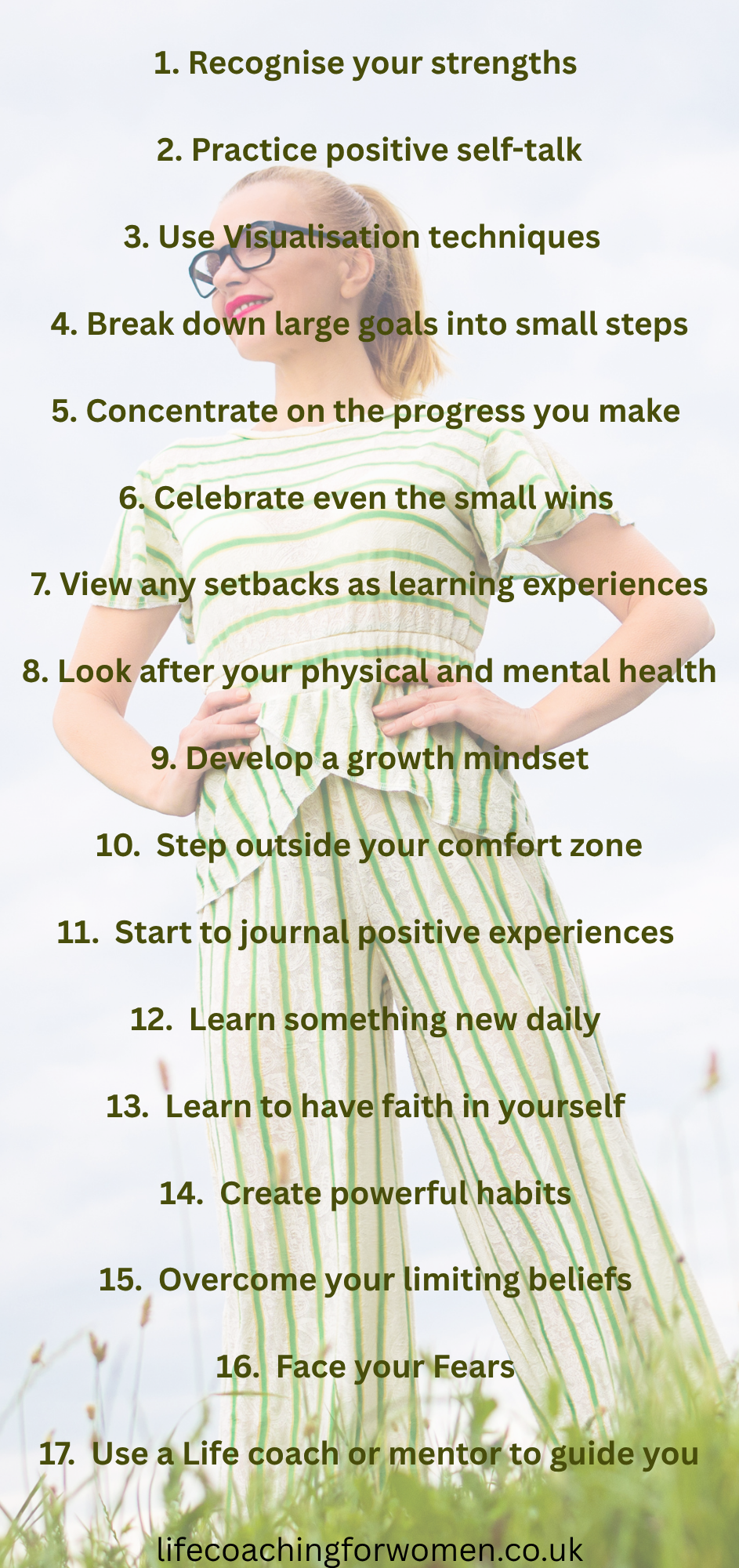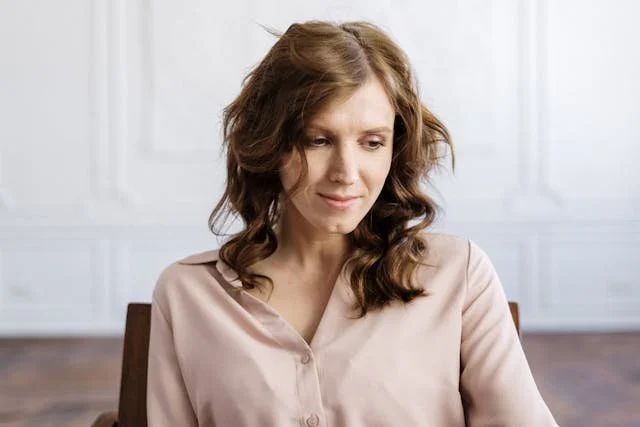How To Believe In Yourself: 17 Easy Ways To Confidence
Why do I struggle to believe in myself?
Have you ever scrolled past someone’s success story and thought, “Good for them, but I could never…”? If that sounds familiar, you’re not alone.
Self-belief can feel out of reach when you’re stuck in self-doubt, but confidence isn’t a personality trait; it’s a practice.
“Why do I struggle to believe in myself?” This is a question I hear often, during coaching sessions with women who, on the surface, look as if they have life sorted.
They are ticking the right boxes and seem to be in control, and yet this question arises so many times…“Why can’t I just believe in myself?”
And if you’ve ever asked it too, know this: you’re not broken, and you’re certainly not alone.
The simple truth is, many of us were never taught how to believe in ourselves. We were taught to keep our heads down, not to get “too big for our boots”, and to put others first.
And while humility has its place, over time it can chip away at our sense of self if we’re not careful.
Another simple truth is, confidence isn’t something reserved for a chosen few, the winners in life; it’s something we build. It’s like a garden, with the right tools, you can start cultivating it, bit by bit.
So if you’ve ever felt like an impostor in your own life, or caught yourself second-guessing even the smallest of decisions, this post is for you.
How do I start to believe in myself?
The simple answer to this question is to start exactly where you are. Maybe a bit wobbly and wondering if you’ve got what it takes, but it’s the only place you can begin.
The truth is, self-belief begins with the tiniest of choices you make. The decision to show up, again and again, even when your inner critic is saying “No” and you are filled with self-doubt.
Here’s what that starting line might look like:
You notice the voice in your head that says “you can’t,” but instead of automatically believing it, you ask instead, “Is that true? Or just what I am used to believing?”
You begin to give yourself credit for the small things you are doing: every time you don’t press snooze, the difficult conversation you didn’t avoid, not worrying about the opinion of someone at work.
You stop waiting to feel ready and plough ahead, even with shaky hands, but with a determination to improve.
And perhaps most importantly, you reach out for help knowing it is a sign of strength, not weakness. That is where the power of coaching lies; more about this later.
17 way
As a life coach, I work with people who’ve quietly carried self-doubt for years. And I’ve seen firsthand what happens when they finally decide to believe in themselves. It’s not magic. It’s momentum. And you can build it, too, right where you are.
Here are 17 confidence-building tools you can start using today. Even one could create a ripple in your life.
1. Recognise your strengths
Isn’t it strange how we can recognise strengths in other people and yet so often struggle to name our own? This is partly cultural; you may have been taught not to “brag” or make a fuss. But recognising your strengths isn’t arrogance. It’s awareness. And awareness is where confidence grows.
You don’t have to shout them from the rooftops. But you do deserve to know what strengths you have and how you can bring them into your life and get recognition for them
So pause for a moment and ask yourself:
What do others thank me for?
When was the last time I felt proud of how I handled something?
2. Practice positive self-talk
I bet you would never dream of speaking to a loved one the way you speak to yourself. And yet, that critical inner voice?
It’s often so loud it can drown out all of the other voices. So start today to train your inner critic and start talking more positively.
The truth is, positive self-talk isn’t about pretending everything’s fine or plastering on a smile when life feels hard. It’s about choosing to speak to yourself in a way that will support your growth rather than sabotaging it.
So instead of, “I’m such a mess,” try, “I’m doing my best, and that’s enough for today.”
Instead of “I’ll never get this right,” try “I’m learning. It’s okay to take time.”
Instead of, “Who do I think I am?” try, “I’m someone who’s figuring it out, and that shows growth.”
3. Use Visualisation techniques
I bet you have heard the phrase, “What you think about, you bring about.” This idea harnesses the power of visualisation to bring your desires into life.
You can also think more confidently by using the same techniques. Imagine you are the confident person you want to be. Keep imagining daily in different situations. The more you do, the more you will start to grow in confidence because your brain will have started to believe that is the person you are and will have used your instincts to bring a more confident attitude into your life.
4. Break down large goals into small steps
Big goals can feel like standing at the bottom of a mountain, looking up and thinking, “Bliimey, how am I going to get to the top?” And the only honest answer is, one step at a time. This is the same for everything in life.
Don’t try to take the whole mountain in one go. Instead, ask: What’s the very first foothold I can find?
If your goal is to build confidence, it might mean speaking up in front of people once this week, not running a TED Talk.
Small steps are powerful. They’re doable and they allow you to build trust in yourself.
And perhaps more importantly, they keep you moving. Even on the days when you aren’t feeling it, progress, however tiny, reminds you that you're still heading in the right direction.
5. Concentrate on the progress you make
You can sometimes be so focused on the finish line that you forget to look back to see how far you have already come.
The truth is, progress is almost invisible at times. Sometimes it’s as simple as not reacting the same way you used to in a certain situation or choosing to rest because it is what you need instead of ploughing on.
But those silent moments matter. They show you there is growth happening. They are evidence that you are evolving, even when it doesn’t feel like it.
So instead of saying, “I’m not there yet,” try asking, “What has shifted in me recently? What would the old me have done differently?”
Confidence is built in these tiny wins. These small moments in life you hardly notice.
6. Celebrate even the small wins
You don’t need to wait for the big moments to feel proud, such as a promotion. Even the smallest wins are something to celebrate. With each win you celebrate your confidence will grow.
It is always good to remember that most transformations aren’t grand occasions. The small wins are the breadcrumbs that lead on to bigger and better things. And when you pause to acknowledge them, even with a simple, “I’m proud of me”, you reinforce the belief that you’re capable, resilient, and moving forward.
7. View any setbacks as learning experiences
There’s no denying set backs can hurt. It could be a missed opportunity, a confidence wobble or something not going the way you wanted. All these experiences can make you question everything. But if you adopt the attitude of set backs as sign posts you will change your thinking.
View it as every time something doesn’t go to plan, you are getting feedback from life. It’s all useful and every experience will help you to grow in confidence.
So instead of asking, “What did I get wrong?”, try asking, “What can this teach me? What will I do differently next time?”
8. Look after your physical and mental health
Confidence isn’t something that just exists in the mind; you will feel it in your body too. Have you ever noticed how much clearer you feel after a brisk walk, a good night’s sleep, or even just a proper breakfast?
This is the link between well-being and self-belief.
If you are physically depleted or mentally overwhelmed, it’s hard to show up as your best self, and it can make self-belief even harder.
Looking after your body might mean exercise that feels good rather than hitting goals. Rest that’s planned and doesn’t make you feel guilty. Food that fuels you, not restricts you.
This isn’t about perfect health routines or dramatic lifestyle changes. It’s about tending to yourself like someone who matters, because you do.
9. Develop a growth mindset
Confidence isn’t about getting it right all of the time; it’s about believing you can learn, even when things go wrong. That’s the heart of a growth mindset.
It’s choosing to see all of your experience, both good and bad, not as a measure of your worth, but as a step in your development.
Instead of saying, “I’m not confident in this,” try asking, “What can I learn here that might help me grow?”
It’s the difference between “I failed” and “I’m finding my way.”
With a growth mindset, confidence becomes less about proving yourself and more about improving yourself. And that shift makes all the difference.
10. Step outside your comfort zone
We all know that comfort zones are well, comfortable. And there’s nothing wrong with a bit of comfort in life. It’s when you stay stuck where it’s familiar, confidence doesn’t get the chance to develop.
Stepping outside your comfort zone doesn’t mean diving headfirst into a project that is going to cause masses of overwhelm. It means trying something slightly different, a bit bigger that allows growth.
It could be speaking up in a meeting, attending a workshop solo, or posting something honest on social media you’ve held back on. It doesn’t have to be dramatic. It just has to be intentional.
Because every time you take a step out of your comfort zone, even if you are trembling inside, you’re sending a message to yourself: “I can do hard things. I can expand.”
These experiences will stack up until one day you notice the new confident you that has emerged.
11. Start to journal positive experiences
Journaling is a gentle practice I encourage all of my clients to engage in because it produces such powerful results.
If you are trying to build your confidence, journaling all of your past, positive experiences will prove to your brain how confident you already are and have been in your life.
This is a powerful mental switch that can push you further and further. Your brain will understand through your journaling practice that the tools you need are already inside you to push yourself forward.
12. Learn something new daily
Confidence doesn’t have to break down the door. It can arrive in the smaller, quieter moments in your life. Each time you stretch yourself, even if in a small way, you send a signal to your brain: I can learn, I can grow, I can adapt.
It doesn’t have to be a huge thing; learning some new phrases in a foreign language, mastering a yoga pose, or a new recipe can all start to slowly build confidence.
Learning keeps you engaged with yourself and the world. And when you make a habit of it, it becomes less about being “good at things” and more about being open to them.
13. Learn to have faith in yourself
Having faith in yourself isn’t about being right or always knowing what you're doing. It’s about simply trusting that, even if you stumble, you’ll get back up. That your self-belief matters. That you’re resilient and ready for what life hands you, even if you don’t feel it in the moment.
Start by remembering this: you’ve already faced things you thought you couldn’t. And you’re still here.
Faith in yourself will begin with the small acts in life and will build up. Listen to your instincts, treat yourself kindly, and most of all, believe in yourself.
14. Create powerful habits
Powerful habits aren't forced. You build them with intention. It’s not about overhauling your entire life overnight. It’s about anchoring small actions into your day that slowly shape your world and how you exist in it.
Think of habits like the scaffolding around your confidence. The more solid the structure, the easier it is to climb.
Begin with something simple; one behaviour that pushes you towards who you want to become. It could be writing down three wins at the end of the day, stepping outside for fresh air each morning, or starting a five-minute meditation before bedtime.
The results come is in the consistency, not the complexity.
15. Overcome your limiting beliefs
Limiting beliefs are outdated thoughts that will hinder where you are meant to go in life. They are the thoughts that sound like “I’m not good enough,” “That’s not for people like me,” or “What if I fail?”
They can be sneaky, too. They often appear as logic or self-protection, when really, they’re fear in disguise. To overcome them, start by noticing them. Write them down. Say them out loud. You’ll often find they lose power once they’re named.
Then gently challenge them. Ask: “Who taught me this? Is it actually true? What evidence do I have that suggests otherwise?”
The magic starts to happen, Reframe them in a larger form, such as: “I’m allowed to grow. I can learn as I go. Others have done it, and so can I.”
16. Face your Fears
Fear is very good at convincing you it’s protecting you when really, it’s keeping you stuck. It tells you things like, “Don’t try, you’ll fail,” And while it may feel familiar, fear isn’t true but can be leading you in the direction you need to go.
Facing your fears doesn’t mean being fearless; it means being brave while still feeling afraid. This is the kind of courage that builds real, grounded confidence.
So today, identify one fear that’s holding you back. Then ask: What’s the tiniest step I could take toward this, just to test the waters?
And when you take that initial step, congratulate yourself. Even if your hands tremble or your voice wobbles, you’re showing yourself what’s possible beyond the limits fear creates.
17. Use a Life coach to guide you
You don’t flip confidence on like a switch. It’s something you build, bit by bit, and having someone who believes in you will help it to grow.
Working with a life coach is like having someone always on your side, to challenge your limiting beliefs, and remind you of the power you’ve always had but may have lost sight of.
Coaching isn’t about being told what to do; it’s about being asked the right questions. The kind that helps you step out of self-doubt and into clarity. The kind that nudge you towards action that actually feels productive.
A life coach offers a safe, non-judgmental space where you can practice new ways of thinking, break old patterns, and stretch your comfort zone without fear of falling.
This is where confidence grows, when you feel supported, understood, and trusted to make your own decisions.
Final Thoughts
If there’s one thing I’ve learned, both in life and in my coaching practice, it’s that confidence isn’t found in one single moment.
It’s gathered, through choices, setbacks, small wins, and brave steps beyond what feels familiar.
Confidence isn’t loud. It doesn’t always stride in with certainty. Sometimes, it arrives almost unheard: “I think I can try.” And that’s more than enough.
You build it when you speak kindly to yourself. When you honour your needs. When you stretch a little and celebrate the stretch.
You build it when you learn, when you reflect, when you decide that you matter in your life; not someday, but now.
Let confidence be something you cultivate, not chase. Let your confidence grow using these tips. Apply them to your life and see what happens.
And if you ever feel like you need someone to walk beside you, to help your confidence grow, I’m here. Not to tell you who to be, but to help you remember who you already are.
If you would like to listen to the audio version of this blog post, please click below;
If you have enjoyed this blog post, please comment and share below.











